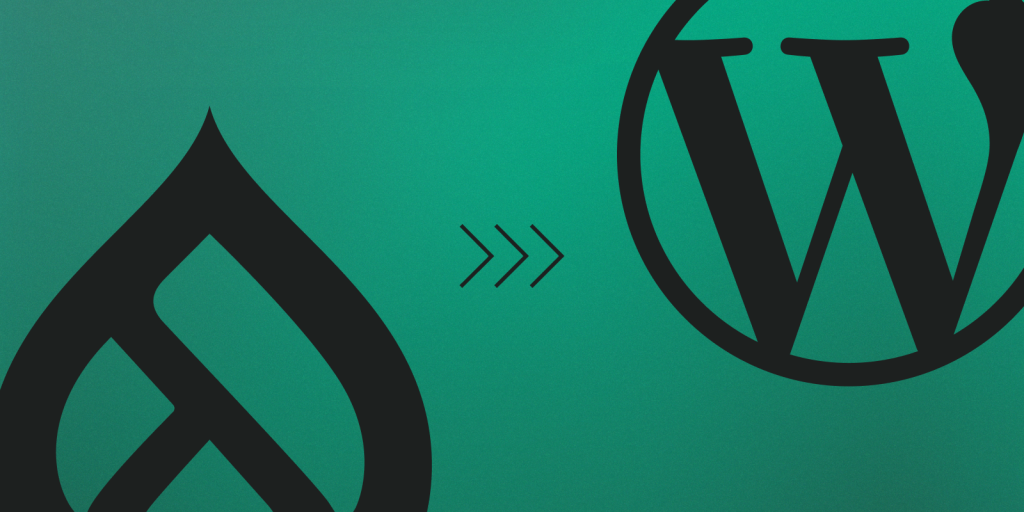When selecting a CMS, the choice has long-term effects on content workflows, scalability, and innovation potential. For enterprises currently using Drupal, transitioning to WordPress offers an opportunity to modernize their digital infrastructure and streamline their operations.
Drupal 7 End of Life: Why Now is the Time to Migrate to WordPress
For enterprises still using Drupal 7, the looming end-of-life (EOL) deadline—January 5, 2025—is a critical milestone. After this date, the Drupal Security Team and Drupal Association will cease providing security or compatibility updates for Drupal 7. Continuing to operate on Drupal 7 after this date comes with several risks:
– Security Vulnerabilities: Sites will be exposed to potential breaches and malicious attacks.
– Compliance Risks: Lack of updates could lead to non-compliance with standards such as FedRAMP, PCI, HIPAA, and SOC 2.
– Compatibility Issues: Outdated software may no longer integrate with modern tools or technologies.
While the Drupal Association offers resources for transitioning to newer versions or purchasing extended support, many organizations are exploring an alternative path: migrating to WordPress.

Why Migrate From Drupal to WordPress?
For many organizations, the decision to move away from Drupal is driven by specific challenges that hinder operational efficiency and innovation. These include:
1. Outdated Technology
Drupal users often work with legacy systems that are expensive and complex to update. Older Drupal versions may require additional instances to handle core functionalities, leading to disjointed workflows and higher maintenance costs. Migrating to WordPress eliminates these inefficiencies, offering an integrated and modernized CMS experience.
2. Cumbersome Editorial Experience
The editing process in Drupal can feel fragmented and slow. Drupal’s flexibility often necessitates a steeper learning curve, making it more suitable for users with technical backgrounds or those willing to invest time in learning the system. In contrast, WordPress offers a highly visual, “what you see is what you get” (WYSIWYG) experience. For example, editors can paste content directly from a Google Doc into WordPress, and it’s automatically formatted for publishing—saving significant time.
3. Limited Scalability for New Features
Many enterprises find that developing and rolling out new features on Drupal can be restrictive. Customizations to improve the editorial experience or add interactive features often require extensive development cycles and high costs. With its robust ecosystem of plugins and developer tools, WordPress enables enterprises to deploy new features quickly and cost-effectively.
4. Fragmented Architecture
Enterprises with decoupled architectures often struggle to integrate Drupal effectively with other services and tools. WordPress’s compatibility with modern frameworks, APIs like GraphQL, and external systems allows organizations to streamline operations while maintaining flexibility.
Moving to WordPress for Innovation at Scale
WordPress has become the go-to CMS for enterprises seeking to modernize their operations and enhance their digital experiences. Here’s why:
AI-Driven Personalization
WordPress enables enterprises to create personalized user experiences using AI-powered tools and integrations. From dynamic content recommendations to predictive user behaviour analysis, WordPress supports the delivery of tailored experiences that engage users and drive conversions.
Interactive Content and Gamification
With WordPress, enterprises can quickly implement cutting-edge features like quizzes, polls, and interactive timelines. These tools enhance user engagement, transforming static content into dynamic experiences. This is particularly valuable for industries like education, healthcare, and media, where engaging users in innovative ways can significantly impact outcomes.
Cross-Platform Innovation
Modern businesses operate across multiple channels, and WordPress’s ability to integrate seamlessly with APIs, mobile applications, and third-party services ensures smooth cross-platform experiences. For example, enterprises can use WordPress to power both their websites and companion mobile apps, maintaining consistency in branding and functionality.
AI Content Generation and Automation
By leveraging AI tools integrated with WordPress, businesses can automate tasks such as content creation, SEO optimization, and even customer support. Enterprises can experiment with AI-assisted blogging, product descriptions, and automated workflows, freeing up resources for strategic initiatives.
Future-Ready Features
Emerging technologies like augmented reality (AR), virtual reality (VR), and blockchain can already be integrated into WordPress solutions, allowing enterprises to stay ahead of industry trends. For instance, a retail business can implement AR-powered product previews, while a nonprofit can leverage blockchain for transparent donation tracking.
Scalable Infrastructure for Innovation
Platforms like WordPress VIP provide the infrastructure to test and deploy innovative projects without sacrificing performance or security. This scalability ensures enterprises can experiment with ambitious initiatives while maintaining uptime and user satisfaction.
Our Approach to Migration
Migrating from Drupal to WordPress is a transformative process, and at Trew Knowledge, we approach it with precision, strategy, and a focus on delivering long-term value. Here’s how we make the transition seamless and impactful:
1. Detailed Assessment and Proof of Concept (PoC)
Before diving into the migration, we conduct a thorough assessment of your current system and create a PoC to validate WordPress’s capabilities for your specific needs. This step allows us to test critical workflows, integrations, and the editorial experience, ensuring WordPress fits your goals correctly.
2. Customized Data Migration
We build custom scripts to accurately move your content, media, and user data. This includes maintaining relationships between content types, such as articles and their respective authors, to preserve editorial integrity. Our process is designed to handle large-scale migrations without data loss or disruption.
3. Integrations and Custom Solutions
We leverage WordPress’s flexible architecture to integrate your site with existing tools and services. Where needed, we develop custom solutions to replace costly third-party systems, helping you streamline operations while reducing costs.
4. Empowering Teams Through Training
We prioritize empowering your team with the knowledge they need to thrive on WordPress. Our training sessions prepare your team to navigate WordPress confidently.
5. Optimized Performance and Scalability
Post-migration, we ensure your WordPress site performs at enterprise standards. We deliver a secure, scalable, and fast web application, giving you the reliability needed for long-term success.
WordPress as the Future of Enterprise CMS
The January 2025 end-of-life deadline for Drupal 7 is a clear signal to act. Enterprises that seize this moment to migrate to WordPress will gain more than just a modern CMS—they’ll secure a platform that fosters innovation, streamlines workflows, and supports ambitious goals.
Trew Knowledge specializes in helping enterprises seamlessly transition to WordPress. Contact us today to learn how we can transform your digital infrastructure.

